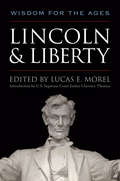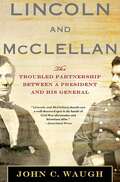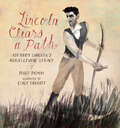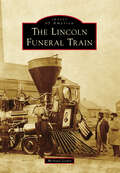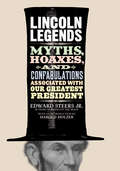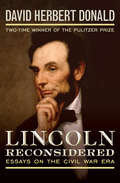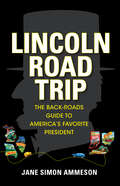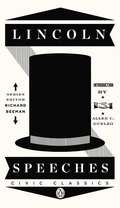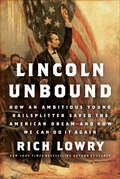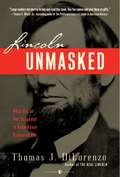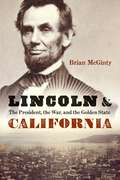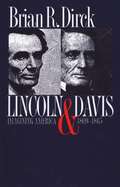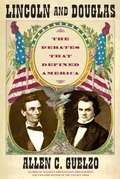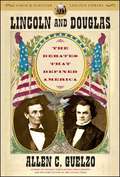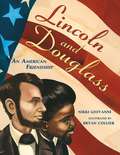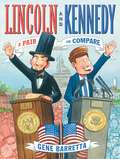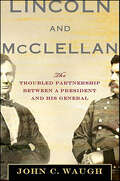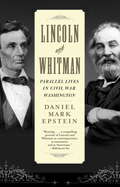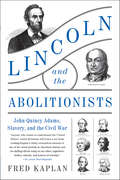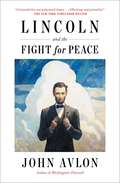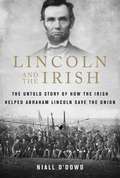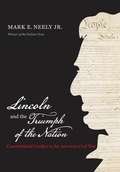- Table View
- List View
Lincoln & Liberty: Wisdom for the Ages
by Lucas E. MorelEssays exploring the sixteenth president&’s political philosophy. Generations of Americans have studied Abraham Lincoln&’s life, presidency, and leadership, often remaking him into a figure suited to the needs and interests of their own time. This illuminating volume takes a different approach to his political thought and practice. Here, a distinguished group of contributors argue that Lincoln&’s relevance today is best expressed by rendering an accurate portrait of him in his own era. They seek to understand Lincoln as he understood himself and as he attempted to make his ideas clear to his contemporaries. What emerges is a portrait of a prudent leader who is driven to return the country to its original principles in order to conserve it. The contributors demonstrate that, far from advocating an expansion of government beyond its constitutional limits, Lincoln defended both the Declaration of Independence and the Constitution. In his introduction, Justice Clarence Thomas discusses how Lincoln used the ideological and structural underpinnings of those founding documents to defeat slavery and secure the liberties that the Republic was established to protect. Other chapters reveal how Lincoln upheld the principle of limited government even as he employed unprecedented war powers. Featuring contributions from leading scholars such as Michael Burlingame, Allen C. Guelzo, Fred Kaplan, and Matthew Pinsker, this innovative collection presents fresh perspectives on Lincoln both as a political thinker and a practical politician. Taken together, these essays decisively demonstrate that the most iconic American president still has much to teach the modern-day student of politics.
Lincoln And Mcclellan: The Troubled Partnership Between A President And His General
by John C. WaughThere was no more remarkable pair in the Civil War than Abraham Lincoln and George McClellan. At only 35 years old, McClellan commanded the Ohio troops early in the war, and won skirmishes for the Union in western Virginia. After the disastrous Union defeat at Bull Run in the summer of 1861, Lincoln sent word for McClellan to come to Washington, and soon elevated him to commander-in-chief of the Union army. But in the late summer and fall of 1861, things took a turn for the worst. Meticulous in his planning and preparations, McClellan began to delay attacking the enemy and developed a penchant for vastly overestimating the Confederate forces he faced. All of this hampered his ability to lead an aggressive force in a fast-moving battlefield environment. Finally losing his patience, Lincoln was famously quoted as saying, "If General McClellan does not want to use the army, I would like to borrow it for a time." Lincoln and McClellan takes an in-depth look at this fascinating relationship, from the early days of the Civil War to the 1864 presidential election when McClellan ran against Lincoln on an anti-war platform and lost. Here, award-winning author John C. Waugh weaves a tale of hubris, paranoia, failure, and triumph, illuminating as never before this unique and complicated alliance.
Lincoln Clears a Path: Abraham Lincoln's Agricultural Legacy
by Peggy ThomasThroughout his life, Abraham Lincoln tried to make life easier for others. Then during the darkest days of the Civil War, when everyone needed hope, President Lincoln cleared a path for all Americans to a better future.As a boy, Abraham Lincoln helped his family break through the wilderness and struggle on a frontier farm. When Lincoln was a young man, friends made it easier for him to get a better education and become a lawyer, so as a politician he paved the way for better schools and roads. President Lincoln cleared a path to better farming, improved transportation, accessible education, and most importantly, freedom. Author Peggy Thomas uncovers Abraham Lincoln's passion for agriculture and his country while illustrator Stacy Innerst cleverly provides a clear look as President Lincoln strives for positive change.
Lincoln Funeral Train, The (Images of America)
by Michael LeavyThe effective end of the American Civil War on April 9, 1865, had hardly sunk in when, only five days later, another disaster stunned the battered and bloodied nation. On the night of April 9, Pres. Abraham Lincoln was assassinated. There would be time for vengeful thoughts later, but first the Great Emancipator was going to get a royal send-off. At the center of what would become a three-week national funeral was a spectacular train that would carry Lincoln's remains, and those of his deceased son, from Washington, DC, to Springfield, Illinois. "The Lincoln Special" steamed slowly out of spring mists, allowing thousands of mourners lining the tracks a lingering view. It was a logistics miracle; a romantic pageant of sorrow and wonder, carried off flawlessly. Through the tears, however, was a sense that America's identity had turned a corner and was about to enter a dynamic and hopeful future. Author of nine books, Michael Leavy is an avid Civil War and railroad historian. Leavy has searched through archives to locate rare photographs and new details and dispel some lingering myths surrounding this tragic but formative American event.
Lincoln Legends: Myths, Hoaxes, and Confabulations Associated with Our Greatest President
by Edward Steers Jr.&“Succinctly and eloquently debunks 14 popular myths about the Great Emancipator's life and death [with] solid documentation.&” —Publishers Weekly In the more than 150 years since his death, Abraham Lincoln has become America&’s most revered president. The mythmaking about this self-made man began early, some of it starting during his campaign for the presidency in 1860. As an American icon, Lincoln has been the subject of speculation and inquiry as authors and researchers have examined every aspect― personal and professional ―of the president&’s life. In Lincoln Legends, noted historian and Lincoln expert Edward Steers Jr. carefully scrutinizes some of the most notorious tall tales and distorted ideas about America&’s sixteenth president. Did he write his greatest speech on the back of an envelope on the way to Gettysburg? Did he appear before a congressional committee to defend his wife against charges of treason? Was he an illegitimate child? Did he have romantic encounters with women other than his wife—or love affairs with men? What really happened in the weeks leading up to April 14, 1865, and in the aftermath of Lincoln;s tragic assassination? Lincoln Legends evaluates the evidence on all sides of the many heated debates about the Great Emancipator, and also traces the often fascinating evolution of flawed theories about Lincoln and the motivations of the individuals―occasionally sincere but more often cynical, self-serving, and nefarious―who are responsible for their dispersal. Based on extensive primary research, Lincoln Legends will settle many of the enduring questions and persistent myths about Lincoln&’s life once and for all. &“Fascinating reading.&” —Tucson Citizen
Lincoln Reconsidered: Essays on the Civil War Era (Vintage Civil War Library)
by David Herbert DonaldA &“brilliant&” look at America&’s sixteenth president by the New York Times–bestselling, Pulitzer Prize–winning author of Lincoln (American Historical Review). First published in 1956 and revised and updated for the twenty-first century, Lincoln Reconsidered is a masterpiece of Civil War scholarship. In a dozen eloquent, witty, and incisive essays, the author of the definitive biography of Abraham Lincoln offers a fresh perspective on topics previously shrouded in myth and hagiography and brings the president&’s tough-mindedness, strategic acumen, and political flexibility into sharp focus. From Lincoln&’s patchwork education to his contradictory interpretations of the Constitution and the legacy of the Founding Fathers, David Herbert Donald reveals the legal mind behind the legend of the Great Emancipator. &“Toward a Reconsideration of the Abolitionists&” sheds new light on the radicalism of the antislavery movement, while &“Herndon and Mary Lincoln&” brilliantly characterizes the complicated relationship between two of the president&’s closest companions. &“Getting Right with Lincoln&” and &“The Folklore Lincoln&” draw on the methods of cultural anthropology to produce a provocative analysis of Lincoln as symbol. No historian has done more to enhance our understanding of Lincoln&’s presidency and the causes and effects of the Civil War than Donald. Lincoln Reconsidered is an entertaining and accessible introduction to his work and a must-read for every student of American history.
Lincoln Road Trip: The Back-Roads Guide to America's Favorite President
by Jane Simon Ammeson“An engagingly written, personable, and intimate portrait of a president that walks in his footsteps and creates a cultural contextual lens through travel.” —Library JournalAmerica’s favorite president sure got around. Before Abraham Lincoln’s sojourned to the Oval Office, he grew up in Kentucky and began his career as a lawyer in Illinois. In fact, Lincoln toured some amazing places throughout the Midwest in his lifetime. In Lincoln Road Trip: The Back-Roads Guide to America’s Favorite President, Jane Simon Ammeson will help you step back into history by visiting the sites where Lincoln lived and visited.This fun and entertaining travel guide includes the stories behind the quintessential Lincoln sites, while also taking you off the beaten path to fascinating and lesser-known historical places. Visit the Log Inn in Warrenton, Indiana (now the oldest restaurant in the state), where Lincoln stayed in 1844 when he was campaigning for Henry Clay. Or visit key places in Lincoln’s life, like the home of merchant Colonel Jones, who allowed a young Abe to read all his books, or Ward’s Academy, where Mary Todd Lincoln attended school.Along with both famous and overlooked places with Lincoln connections, Ammeson profiles nearby attractions to round out your trip, like Holiday World, a family-owned amusement park that goes well with a trip to the Lincoln Boyhood National Memorial and Lincoln State Park. Featuring new and exciting Lincoln tales from Springfield, Illinois; Beardstown, Kentucky; Booneville, Indiana; Alton, Illinois; and many more, Lincoln Road Trip is a fun adventure through America’s heartland that will bring Lincoln’s incredible story to life.
Lincoln Speeches
by Abraham LincolnThis is an EXACT reproduction of a book published before 1923. This IS NOT an OCR'd book with strange characters, introduced typographical errors, and jumbled words. This book may have occasional imperfections such as missing or blurred pages, poor pictures, errant marks, etc. that were either part of the original artifact, or were introduced by the scanning process. We believe this work is culturally important, and despite the imperfections, have elected to bring it back into print as part of our continuing commitment to the preservation of printed works worldwide. We appreciate your understanding of the imperfections in the preservation process, and hope you enjoy this valuable book.
Lincoln Unbound: How an Ambitious Young Railsplitter Saved the American Dream---And How We Can Do It Again
by Rich LowryIn this thoughtful mix of history and politics, the New York Times bestselling author and editor of National Review—the conservative bible founded by William F. Buckley, Jr.—traces Abraham Lincoln's ambitious climb from provincial upstart to political powerhouse and calls for a renewal of the Lincoln ethic of relentless striving.Revered today across the political spectrum, Abraham Lincoln believed in a small but active government in a nation defined by aspiration. Fired by an indomitable ambition from a young age, the man who would be immortalized as the "railsplitter" never wanted to earn his living with an ax. He educated himself in a frontier environment characterized by mind-numbing labor and then turned his back on that world. All his life, he preached a gospel of work and discipline toward the all-important ends of self-improvement and individual advancement. As a Whig and then a Republican, he worked to smash the rural backwardness in which he was raised and the Southern plantation economy that depended on human bondage.Both were unacceptably stultifying of human potential. In short, Lincoln lived the American Dream and succeeded in opening a way to it for others. He saw in the nation's founding documents the unchanging foundation of an endlessly dynamic society. He embraced the market and the amazing transportation and communications revolutions beginning to take hold. He helped give birth to the modern industrial economy that arose before the Civil War and that took off after it.His vision of an upwardly mobile society that rewards and supports individual striving was wondrously realized. Now it is under threat. Economic stagnation and social breakdown are undermining mobility and the American way. To meet these challenges, Rich Lowry draws us back to the lessons of Lincoln. It is imperative, he argues, to preserve a fluid economy and the bourgeois virtues that make it possible for individuals to thrive within it.
Lincoln Unmasked: What You're Not Supposed to Know About Dishonest Abe
by Thomas DilorenzoWhat if you were told that the revered leader Abraham Lincoln was actually a political tyrant who stifled his opponents by suppressing their civil rights? What if you learned that the man so affectionately referred to as the "Great Emancipator" supported white supremacy and pledged not to interfere with slavery in the South? Would you suddenly start to question everything you thought you knew about Lincoln and his presidency? You should. Thomas J. DiLorenzo, who ignited a fierce debate about Lincoln's legacy with his book The Real Lincoln, now presents a litany of stunning new revelations that explode the most enduring (and pernicious) myths about our sixteenth president. Marshaling an astonishing amount of new evidence, Lincoln Unmasked offers an alarming portrait of a political manipulator and opportunist who bears little resemblance to the heroic, stoic, and principled figure of mainstream history. Did you know that Lincoln . . . * did NOT save the union? In fact, Lincoln did more than any other individual to destroy the voluntary union the Founding Fathers recognized. * did NOT want to free the slaves? Lincoln, who did not believe in equality of the races, wanted the Constitution to make slavery "irrevocable." * was NOT a champion of the Constitution? Contrary to his high-minded rhetoric, Lincoln repeatedly trampled on the Constitution--and even issued an arrest warrant for the chief justice of the United States! * was NOT a great statesman? Lincoln was actually a warmonger who manipulated his own people into a civil war.* did NOT utter many of his most admired quotations? DiLorenzo exposes a legion of statements that have been falsely attributed to Lincoln for generations--usually to enhance his image. In addition to detailing Lincoln's offenses against the principles of freedom, equality, and states' rights, Lincoln Unmasked exposes the vast network of academics, historians, politicians, and other "gatekeepers" who have sanitized his true beliefs and willfully distorted his legacy. DiLorenzo reveals how the deification of Lincoln reflects a not-so-hidden agenda to expand the size and scope of the American state far beyond what the Founding Fathers envisioned--an expansion that Lincoln himself began. The hagiographers have shaped Lincoln's image to the point that it has become more fiction than fact. With Lincoln Unmasked, DiLorenzo shows us an Abraham Lincoln without the rhetoric, lies, and political bias that have clouded a disastrous president's enduring damage to the nation.
Lincoln and California: The President, the War, and the Golden State
by Brian McGintyThe ties that bound Abraham Lincoln to California, and California to Lincoln, have long been overlooked by historians. Although the great Civil War president has been the subject of thousands of books, his important relationship with the Western state, both before and during the war—the part it played in bringing on the great conflict and the help it gave him in winning it—have been little described and imperfectly understood. In Lincoln and California Brian McGinty explains the relationship between the president and the Golden State, describing important events that took place in California and elsewhere during Lincoln’s lifetime. He includes the histories of Lincoln’s close friends and personal acquaintances who made history as they went to California, lived there, and helped to keep it part of the imperiled Union. McGinty demonstrates that California was in large part responsible for beginning the Civil War, as the principal purpose of its conquest in the Mexican War was to acquire land into which the Southern states could extend their cotton-growing and slaveholding empire. <p><p>The decision of California’s first voters to exclude slavery from the state but to enact virulently racist legislation encouraged Southerners’ hope that, if they established a separate republic, it would become an independent slave nation with the power to extend its territory to the Pacific coast of North America and into the Caribbean and Latin America. Lincoln’s opposition to their plans unleashed the Civil War. <p><p>As the struggle played out, however, the hopes of the proslavery Confederates were ultimately defeated because California played a vital role in helping Lincoln save the Union. Lincoln and California shines new light on an important state, a pivotal president, and a turning point in American history.
Lincoln and Davis: Imagining America, 1809-1865
by Brian R. DirckAbraham Lincoln: the Great Emancipator, savior of the Union, and revered national hero. Jefferson Davis: defender of slavery, leader of a lost cause, and forlorn object of scorn. Both Lincoln and Davis remain locked in the American psyche as iconic symbols of victory and defeat. They presided over a terrible war that decided the fate of slavery and severely tested each man's resolve and potential for greatness. But, as Brian Dirck shows, such images tend to obscure the larger visions that compelled both men to pursue policies and actions that resulted in such a devastating national tragedy. Going well beyond most conventional accounts, Dirck examines Lincoln's and Davis's respective ideas concerning national identity, highlighting the strengths and shortcomings of each leader's worldview. By focusing on issues that have often been overlooked in previous studies of Lincoln and Davis-and of the war in general-he reveals the ways in which these two leaders viewed that imagined community called the American nation. The first comprehensive and detailed study to compare the two men's national imaginations, Dirck's study provides a provocative analysis of how their everyday lives-the influence of fathers and friends, jobs and homes-worked in complex ways to shape Lincoln's and Davis's perceptions of what the American nation was supposed to be and could become and how those images could reject or accommodate the institution of slavery. Dirck contends that Lincoln subscribed to the notion of a "nation of strangers" in which people never really knew one another's hearts, reflecting his wariness of sentimental attachment, while Davis held to a "community of sentiment" based on honor and comradeship that depended a great deal on emotional bonding. As Dirck shows, these two ideals are very much a part of the current national conversation-among citizens, scholars, and politicians—that has brought Davis back into the fold of great Americans while challenging many of the clichés that surround the Lincoln myth. Ultimately, Dirck argues, the imagined communities of these two remarkable men transcend the experience of war to illuminate the ongoing debates over what it means to be an American. Through this engaging and original work, he urges a restoration of balance to our understanding—not only of Lincoln and Davis, but also of the contributions made by North and South alike to those debates.
Lincoln and Douglas: The Debates That Defined America
by Allen C. GuelzoIn 1858, Abraham Lincoln was known as a successful Illinois lawyer who had achieved some prominence in state politics as a leader in the new Republican Party. Two years later, he was elected president and was on his way to becoming the greatest chief executive in American history. What carried this one-term congressman from obscurity to fame was the campaign he mounted for the United States Senate against the country's most formidable politician, Stephen A. Douglas, in the summer and fall of 1858. Lincoln challenged Douglas directly in one of his greatest speeches -- "A house divided against itself cannot stand" -- and confronted Douglas on the questions of slavery and the inviolability of the Union in seven fierce debates. As this brilliant narrative by the prize-winning Lincoln scholar Allen Guelzo dramatizes, Lincoln would emerge a predominant national figure, the leader of his party, the man who would bear the burden of the national confrontation. Of course, the great issue between Lincoln and Douglas was slavery. Douglas was the champion of "popular sovereignty," of letting states and territories decide for themselves whether to legalize slavery. Lincoln drew a moral line, arguing that slavery was a violation both of natural law and of the principles expressed in the Declaration of Independence. No majority could ever make slavery right, he argued. Lincoln lost that Senate race to Douglas, though he came close to toppling the "Little Giant," whom almost everyone thought was unbeatable. Guelzo's Lincoln and Douglas brings alive their debates and this whole year of campaigns and underscores their centrality in the greatest conflict in American history. The encounters between Lincoln and Douglas engage a key question in American political life: What is democracy's purpose? Is it to satisfy the desires of the majority? Or is it to achieve a just and moral public order? These were the real questions in 1858 that led to the Civil War. They remain questions for Americans today.
Lincoln and Douglas: The Debates that Defined America
by Allen C. GuelzoFrom the two-time winner of the prestigious Lincoln Prize, a stirring and surprising account of the debates that made Lincoln a national figure and defined the slavery issue that would bring the country to war.In 1858, Abraham Lincoln was known as a successful Illinois lawyer who had achieved some prominence in state politics as a leader in the new Republican Party. Two years later, he was elected president and was on his way to becoming the greatest chief executive in American history. What carried this one-term congressman from obscurity to fame was the campaign he mounted for the United States Senate against the country’s most formidable politician, Stephen A. Douglas, in the summer and fall of 1858. As this brilliant narrative by the prize-winning Lincoln scholar Allen Guelzo dramatizes, Lincoln would emerge a predominant national figure, the leader of his party, the man who would bear the burden of the national confrontation. Lincoln lost that Senate race to Douglas, though he came close to toppling the “Little Giant,” whom almost everyone thought was unbeatable. Guelzo’s Lincoln and Douglas brings alive their debates and this whole year of campaigns and underscores their centrality in the greatest conflict in American history. The encounters between Lincoln and Douglas engage a key question in American political life: What is democracy's purpose? Is it to satisfy the desires of the majority? Or is it to achieve a just and moral public order? These were the real questions in 1858 that led to the Civil War. They remain questions for Americans today.
Lincoln and Douglass: An American Friendship
by Nikki Giovanni Bryan CollierOur 16th president is known for many things: He delivered the Emancipation Proclamation and the Gettysburg Address.He was tall and skinny and notoriously stern-looking. And he also had some very strong ideas about abolishing slavery, ideas which brought him into close contact with another very visible public figure: Frederick Douglass. Douglass was born a slave but escaped in 1838 and became one of the central figures in the American abolitionist movement. <P><P>This book offers a glimpse into the unusual friendship between two great American leaders. At a time when racial tensions were high and racial equality was not yet established, Lincoln and Douglass formed a strong bond over shared ideals and worked alongside each other for a common goal. <P><P>The acclaimed team behind Rosa, winner of the Coretta Scott King Award and a Caldecott Honor book, join forces once more to portray this historic friendship at a unique moment in time. Lexile Measure: AD970L
Lincoln and Grant: The Westerners Who Won the Civil War
by Edward H. Bonekemper IIILincoln and Grant is an intimate dual-portrait of President Abraham Lincoln and General Ulysses S. Grant: their ordinary "Western" backgrounds, their early struggles to succeed, and their history-making relationship during the Civil War. Though generally remembered by history as two very different personalities, the soft-spoken Lincoln and often-crude Grant in fact shared a similar drive and determination, as this in-depth character study illustrates.
Lincoln and Kennedy: A Pair To Compare
by Christy OttavianoThis book traces the some of the highlights of the presidencies of Abraham Lincoln and John F. Kennedy.
Lincoln and McClellan: The Troubled Partnership between a President and His General
by John C. WaughThere was no more remarkable pair in the Civil War than Abraham Lincoln and George McClellan. At only 35 years old, McClellan commanded the Ohio troops early in the war, and won skirmishes for the Union in western Virginia. After the disastrous Union defeat at Bull Run in the summer of 1861, Lincoln sent word for McClellan to come to Washington, and soon elevated him to commander-in-chief of the Union army. But in the late summer and fall of 1861, things took a turn for the worst. Meticulous in his planning and preparations, McClellan began to delay attacking the enemy and developed a penchant for vastly overestimating the Confederate forces he faced. All of this hampered his ability to lead an aggressive force in a fast-moving battlefield environment. Finally losing his patience, Lincoln was famously quoted as saying, "If General McClellan does not want to use the army, I would like to borrow it for a time."Lincoln and McClellan takes an in-depth look at this fascinating relationship, from the early days of the Civil War to the 1864 presidential election when McClellan ran against Lincoln on an anti-war platform and lost. Here, award-winning author John C. Waugh weaves a tale of hubris, paranoia, failure, and triumph, illuminating as never before this unique and complicated alliance.
Lincoln and Whitman
by Daniel Mark EpsteinIt was more than coincidence--indeed, it was all but fate--that the lives and thoughts of Abraham Lincoln and Walt Whitman should converge during the terrible years of the Civil War. Kindred spirits despite their profound differences in position and circumstance, Lincoln and Whitman shared a vision of the democratic character that sprang from the deepest part of their being. They had read or listened to each other's words at crucial turning points in their lives. Both were utterly transformed by the tragedy of the war. In this radiant book, poet and biographer Daniel Mark Epstein tracks the parallel lives of these two titans from the day that Lincoln first read Leaves of Grass to the elegy Whitman composed after Lincoln's assassination in 1865.Drawing on the rich trove of personal and newspaper accounts, diary records, and lore that has accumulated around both the president and the poet, Epstein structures his double portrait in a series of dramatic, atmospheric scenes. Whitman, though initially skeptical of the Illinois Republican, became enthralled when Lincoln stopped in New York on the way to his first inauguration. During the war years, after Whitman moved to Washington to minister to wounded soldiers, the poet's devotion to the president developed into a passion bordering on obsession. "Lincoln is particularly my man, and by the same token, I am Lincoln's man." As Epstein shows, the influence and reverence flowed both ways. Lincoln had been deeply immersed in Whitman's verse when he wrote his incendiary "House Divided" speech, and Whitman remained an influence during the darkest years of the war. But their mutual impact went beyond the intellectual. Epstein brings to life the many friends and contacts his heroes shared--Lincoln's debonair private secretary John Hay, the fiery abolitionist senator Charles Sumner, the mysterious and possibly dangerous Polish Count Gurowski--as he unfolds the story of their legendary encounters in New York City and especially Washington during the war years. Blending history, biography, and a deeply informed appreciation of Whitman's verse and Lincoln's rhetoric, Epstein has written a masterful and original portrait of two great men and the era they shaped through the vision they held in common.From the Hardcover edition.
Lincoln and Whitman: Parallel Lives in Civil War Washington
by Daniel Mark EpsteinIt was more than coincidence--indeed, it was all but fate--that the lives and thoughts of Abraham Lincoln and Walt Whitman should converge during the terrible years of the Civil War. Kindred spirits despite their profound differences in position and circumstance, Lincoln and Whitman shared a vision of the democratic character that sprang from the deepest part of their being. They had read or listened to each other's words at crucial turning points in their lives. Both were utterly transformed by the tragedy of the war. In this radiant book, poet and biographer Daniel Mark Epstein tracks the parallel lives of these two titans from the day that Lincoln first readLeaves of Grassto the elegy Whitman composed after Lincoln's assassination in 1865. Drawing on the rich trove of personal and newspaper accounts, diary records, and lore that has accumulated around both the president and the poet, Epstein structures his double portrait in a series of dramatic, atmospheric scenes. Whitman, though initially skeptical of the Illinois Republican, became enthralled when Lincoln stopped in New York on the way to his first inauguration. During the war years, after Whitman moved to Washington to minister to wounded soldiers, the poet's devotion to the president developed into a passion bordering on obsession. "Lincoln is particularly my man, and by the same token, I am Lincoln's man. " As Epstein shows, the influence and reverence flowed both ways. Lincoln had been deeply immersed in Whitman's verse when he wrote his incendiary "House Divided" speech, and Whitman remained an influence during the darkest years of the war. But their mutual impact went beyond the intellectual. Epstein brings to life the many friends and contacts his heroes shared--Lincoln's debonair private secretary John Hay, the fiery abolitionist senator Charles Sumner, the mysterious and possibly dangerous Polish Count Gurowski--as he unfolds the story of their legendary encounters in New York City and especially Washington during the war years. Blending history, biography, and a deeply informed appreciation of Whitman's verse and Lincoln's rhetoric, Epstein has written a masterful and original portrait of two great men and the era they shaped through the vision they held in common.
Lincoln and the Abolitionists: John Quincy Adams, Slavery, and the Civil War
by Fred Kaplan"Anyone who wants to understand the United States' racial divisions will learn a lot from reading Kaplan's richly researched account of one of the worst periods in American history and its chilling effects today in our cities, legislative bodies, schools, and houses of worship." — St. Louis Post-DispatchThe acclaimed biographer Fred Kaplan returns with a controversial exploration of how Abraham Lincoln’s and John Quincy Adams’ experiences with slavery and race shaped their differing viewpoints, providing perceptive insights into these two great presidents and a revealing perspective on race relations in modern AmericaThough the Emancipation Proclamation, limited as it was, ultimately defined his presidency, Lincoln was a man shaped by the values of the white America into which he was born. While he viewed slavery as a moral crime abhorrent to American principles, he disapproved of antislavery activists. Until the last year of his life, he advocated “voluntary deportation,” concerned that free blacks in a white society would result in centuries of conflict. In 1861, he reluctantly took the nation to war to save it. While this devastating struggle would preserve the Union, it would also abolish slavery—creating the biracial democracy Lincoln feared.Years earlier, John Quincy Adams had become convinced that slavery would eventually destroy the Union. Only through civil war, sparked by a slave insurrection or secession, would slavery end and the Union be preserved. Deeply sympathetic to abolitionists and abolitionism, Adams believed that a multiracial America was inevitable. Lincoln and the Abolitionists, a frank look at Lincoln, “warts and all,” including his limitations as a wartime leader, provides an in-depth look at how these two presidents came to see the issues of slavery and race, and how that understanding shaped their perspectives.Its supporting cast of characters is colorful, from the obscure to the famous: Dorcas Allen, Moses Parsons, Usher F. Linder, Elijah Lovejoy, William Channing, Wendell Phillips, Rufus King, Hannibal Hamlin, Andrew Johnson, Abigail Adams, John Adams, Thomas Jefferson, Henry Clay, Stephen A. Douglas, and Frederick Douglass, among scores of significant others. In a far-reaching historical narrative, Kaplan offers a nuanced appreciation of the great men—Lincoln as an antislavery moralist who believed in an exclusively white America, and Adams as an antislavery activist who had no doubt that the United States would become a multiracial nation—and the events that have characterized race relations in America for more than a century, a legacy that continues to haunt us all.
Lincoln and the Democrats
by Neely Mark E. Jr.Lincoln and the Democrats describes the vexatious behavior of a two-party system in war and points to the sound parts of the American system which proved to be the country's salvation: local civic pride, and quiet nonpartisanship in mobilization and funding for the war, for example. While revealing that the role of a noxious 'white supremacy' in American politics of the period has been exaggerated - as has the power of the Copperheads - Neely revives the claim that the Civil War put the country on the road to 'human rights', and also uncovers a previously unnoticed tendency toward deceptive and impractical grandstanding on the Constitution during war in the United States.
Lincoln and the Fight for Peace
by John AvlonA groundbreaking, revelatory history of Abraham Lincoln&’s plan to secure a just and lasting peace after the Civil War—a vision that inspired future presidents as well as the world&’s most famous peacemakers, including Nelson Mandela, Mahatma Gandhi, and Martin Luther King, Jr. It is a story of war and peace, race and reconciliation.As the tide of the Civil War turned in the spring of 1865, Abraham Lincoln took a dangerous two-week trip to visit the troops on the front lines accompanied by his young son, seeing combat up close, meeting liberated slaves in the ruins of Richmond, and comforting wounded Union and Confederate soldiers. The power of Lincoln&’s personal example in the closing days of the war offers a portrait of a peacemaker. He did not demonize people he disagreed with. He used humor, logic, and scripture to depolarize bitter debates. Balancing moral courage with moderation, Lincoln believed that decency could be the most practical form of politics, but he understood that people were more inclined to listen to reason when greeted from a position of strength. Ulysses S. Grant&’s famously generous terms of surrender to General Robert E. Lee at Appomattox that April were a direct expression of the president&’s belief that a soft peace should follow a hard war.While his assassination sent the country careening off course, Lincoln&’s vision would be vindicated long after his death, inspiring future generations in their own quests to secure a just and lasting peace. As US General Lucius Clay, architect of the post-WWII German occupation, said when asked what guided his decisions: &“I tried to think of the kind of occupation the South would have had if Abraham Lincoln had lived.&” Lincoln and the Fight for Peace reveals how Lincoln&’s character informed his commitment to unconditional surrender followed by a magnanimous peace. Even during the Civil War, surrounded by reactionaries and radicals, he refused to back down from his belief that there is more that unites us than divides us. But he also understood that peace needs to be waged with as much intensity as war. Lincoln&’s plan to win the peace is his unfinished symphony, but in its existing notes, we can find an anthem that can begin to bridge our divisions today.
Lincoln and the Irish: The Untold Story of How the Irish Helped Abraham Lincoln Save the Union
by Niall O'DowdAn unprecedented narrative of the relationship that swung the Civil War. When Pickett charged at Gettysburg, it was the all-Irish Pennsylvania 69th who held fast while the surrounding regiments broke and ran. And it was Abraham Lincoln who, a year earlier at Malvern Hill, picked up a corner of one of the Irish colors, kissed it, and said, “God bless the Irish flag.” Lincoln and the Irish untangles one of the most fascinating subtexts of the Civil War: Abraham Lincoln’s relationship with the men and women coming to America to escape the Irish famine. Renowned Irish-American journalist Niall O’Dowd gives unprecedented insight into a relationship that began with mutual disdain. Lincoln saw the Irish as instinctive supporters of the Democratic opposition, while the Irish saw the English landlord class in Lincoln’s Republicans. But that dynamic would evolve, and the Lincoln whose first political actions included intimidating Irish voters at the polls would eventually hire Irish nannies and donate to the Irish famine fund. When he was voted into the White House, Lincoln surrounded himself with Irish staff, much to the chagrin of a senior aide who complained about the Hibernian cabal. And the Irish would repay Lincoln’s faith—their numbers and courage would help swing the Civil War in his favor, and among them would be some of his best generals and staunchest advocates.
Lincoln and the Triumph of the Nation
by Mark E. NeelyThe Civil War placed the U.S. Constitution under unprecedented--and, to this day, still unmatched--strain. In Lincoln and the Triumph of the Nation, Pulitzer Prize-winning historian Mark Neely examines for the first time in one book the U.S. Constitution and its often overlooked cousin, the Confederate Constitution, and the ways the documents shaped the struggle for national survival.Previous scholars have examined wartime challenges to civil liberties and questions of presidential power, but Neely argues that the constitutional conflict extended to the largest questions of national existence. Drawing on judicial opinions, presidential state papers, and political pamphlets spiced with the everyday immediacy of the partisan press, Neely reveals how judges, lawyers, editors, politicians, and government officials, both North and South, used their constitutions to fight the war and save, or create, their nation. Lincoln and the Triumph of the Nation illuminates how the U.S. Constitution not only survived its greatest test but emerged stronger after the war. That this happened at a time when the nation's very existence was threatened, Neely argues, speaks ultimately to the wisdom of the Union leadership, notably President Lincoln and his vision of the American nation.
